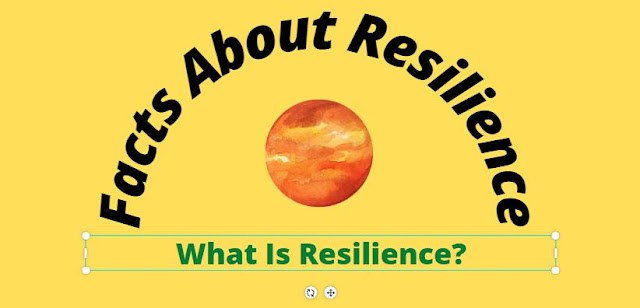Resilience Facing Life's Challenges, Adversities, and Crises
What is flexibility, for what reason is it so significant, and how can you say whether you're sufficiently tough? Flexibility is normally characterized as the ability to recuperate from troublesome life occasions.
"It's your capacity to withstand misfortune and ricochet back and develop regardless of life's slumps," says Amit Sood, MD, the leader head of the Global Center for Resiliency and Well-Being, maker of the Resilient Option program, and previous educator of medication at the Mayo Clinic in Rochester, Minnesota.
Versatility isn't a trampoline, where you're down one second and up the following. It's more similar to ascending a mountain without a path map. It requires some investment, strength, and help from individuals around you, and you'll probably encounter difficulties en route. Yet, in the long run, you arrive at the top and glance back at how far you've come.
What Is Resilience Theory?
Single face a global range of misfortune throughout everyday life. There are close-to-home emergencies, like disease, loss of a friend or family member, misuse, harassment, position misfortune, and monetary precariousness. There is the common truth of sad occasions in the news, for example, fear-based oppressor assaults, mass shootings, cataclysmic events, and obviously the COVID-19 pandemic. Individuals need to figure out how to adapt to and work through extremely testing educational encounters.
Strength hypothesis alludes to the thoughts encompassing how individuals are influenced by and adjust to things like difficulty, change, misfortune, and hazard. Being tough doesn't imply that individuals don't encounter pressure, passionate commotion, and languishing. A few groups liken flexibility with mental strength, yet showing versatility incorporates working through enthusiastic torment and languishing.
Flexibility is definitely not a fixed quality. Adaptability, versatility, and diligence can assist with peopling tap into their strength by changing certain musings and practices. Exploration shows that understudies who accept that both scholarly capacities and social credits can be created show a lower pressure reaction to misfortune and further developed execution. (1)
Dr. Sood, who is an individual from the Everyday Health Wellness Advisory Board, accepts that strength can be characterized as far as five standards:
• Gratitude
• Compassion
• Acceptance
• Meaning
• Forgiveness
Top Factors of Resilience
Creating strength is both perplexing and individual. It's anything but a mix of internal qualities and external assets, and there is definitely not an all-inclusive recipe for getting stronger. All individuals are extraordinary: While one individual may foster side effects of gloom or nervousness following an awful mishap, someone else probably won't report any indications whatsoever.
A blend of variables adds to building versatility, and there is anything but an easy daily agenda to work through affliction. In one longitudinal investigation, defensive variables for teenagers in danger for wretchedness, like family union, positive self-evaluations, and great relational relations, were related to versatile results in youthful adulthood. (2)
While people measure injury and difficulty in an unexpected way, there are sure defensive factors that assist with building strength by further developing adapting abilities and flexibility. These components include:
• Social Support Research distributed in 2015 in the diary Ecology and Society showed that social frameworks that offer help in the midst of emergency or injury support flexibility in the person. (3) Social help can incorporate prompt or more distant family, local area, companions, and associations.
• Realistic Planning The capacity to make and do practical plans assists people with taking advantage of their natural abilities and spotlight on attainable objectives.
• Self-Esteem A good self-appreciation and trust in one's qualities can fight off sensations of powerlessness when stood up to with misfortune.
• Coping Skills Coping and critical thinking abilities assist with engaging an individual who needs to work through affliction and beat the difficulty.
• Communication Skills Being ready to convey plainly and successfully assists individuals with looking for help, prepare assets, and make a move.
• Emotional Regulation The ability to oversee conceivably overpowering feelings (or look for help to work through them) assists individuals with keeping up with the center while conquering a test.
Exploration on flexibility hypothesis shows that deal with a person's prompt climate and advance defensive components while tending to requests and stressors that the individual countenances. (4) all in all, strength isn't something individuals tap into just during overpowering snapshots of misfortune. It works as individuals experience a wide range of stressors consistently, and defensive variables can be supported.
Why Is Resilience Important?
Versatility is the thing that gives individuals the enthusiastic solidarity to adapt to injury, affliction, and difficulty. Versatile individuals use their assets, qualities, and abilities to defeat difficulties and work through mishaps.
Individuals who need versatility are bound to feel overpowered or vulnerable and depend on undesirable adapting procedures (like aversion, seclusion, and self-medicine). One examination showed that patients who had endeavored self-destruction had fundamentally lower versatility scale scores than patients who had never endeavored self-destruction. (5)
Versatile individuals do encounter pressure, difficulties, and troublesome feelings, yet they tap into their qualities and look for help from emotionally supportive networks to conquer difficulties and work through issues. Flexibility enables them to acknowledge and adjust to a circumstance and push ahead.
Versatility is "the center strength you use to lift the heap of life," says Sood.
What Are the 7 Cs of Resilience?
Pediatrician Ken Ginsburg, MD, who works in juvenile medication at the Children's Hospital of Philadelphia, fostered the 7 Cs model of strength to help children and youngsters assemble the abilities to be more joyful and stronger.
The 7 Cs model is based on two central issues:
• Young individuals live up or down to the assumptions that are set for them and need grown-ups who love them genuinely and hold them to exclusive requirements.
• How we model flexibility for youngsters is undeniably more significant than what we say about it.





0 Comments